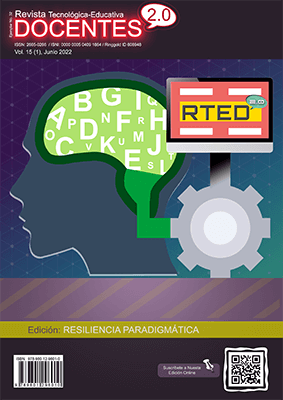Training of Readers from the Literary Proposal of María Teresa Andruetto
 DOI:
https://doi.org/10.37843/rted.v15i1.282
DOI:
https://doi.org/10.37843/rted.v15i1.282
Main Article Content
Abstract
Over time, the conception of reading has changed and its processes and strategies. In ??the Spanish language, reading and writing are two terms that can be defined as pillars of education and are also nominated as human skills that allow discerning and shaping knowledge. The objective was to strengthen communication skills in students through the literary proposal of María Teresa Andruetto to encourage interest in reading various texts, which contributed to the consolidation of critical thinking and the formation of active subjects intellectually. The research was carried out under the humanistic paradigm, with a qualitative approach, action-research design, and a practical type. The population to which the proposal applied was a group of 12 students shown during each of the participatory classes and interested in books worked. A survey was conducted to collect information about the number of books read during the last year. The validation obtained arose from the analysis of each of the workshops designed for each session, and subsequently, triangulation was established with the instruments used for data collection. Finally, by applying reading comprehension strategies in children's literature, it was possible to strengthen the levels of comprehension and incite interest in reading, thus achieving active subjects, with more possibilities in the consolidation of critical thinking.
Downloads
Metrics
Article Details

This work is licensed under a Creative Commons Attribution-NonCommercial-NoDerivatives 4.0 International License.
Those authors who have publications in our journal accept the following terms:
- When a work is accepted for publication, the author retains rights of reproduction, distribution of his/her article for exploitation in all countries of the world in the format provided by our magazine and any other magnetic medium, optical, and digital.
- Authors will retain their copyright and guarantee the journal the right first to publish their work, which will be simultaneously subject to the Creative Commons Acknowledgment License (Attribution-NonCommercial-NoDerivatives 4.0 International (CC BY-NC-ND 4.0)). That allows third parties to copy and redistribute the material in any medium or format, under the following conditions: Acknowledgment - You must properly acknowledge authorship, provide a link to the license, and indicate if any changes have been made. You may do so in any reasonable way, but not in a way that suggests you have the licensor's endorsement or receive it for your use. NonCommercial - You may not use the material for a commercial purpose. NoDerivatives - If you remix, transform, or build from the material, you cannot broadcast the modified material. There are no additional restrictions - You cannot apply legal terms or technological measures that legally restrict you from doing what the license allows.
- Authors may adopt other non-exclusive license agreements to distribute the published version of the work (e.g., deposit it in an institutional archive or publish it in a monographic volume) provided that the initial publication in this journal is indicated.
- Authors are allowed and recommended to disseminate their work through the Internet (e.g., in institutional telematic archives, repositories, libraries, or their website), producing exciting exchanges and increasing the published work's citations.
- Request of withdrawal an article has to be done in writing by the author to the Editor, becoming effective after a written response from the Editor. For this purpose, the author or authors will send correspondence via e-mail: [email protected].
- The author will not receive financial compensation for the publication of his work.
- All Docentes 2.0 Journal publications are under the Open Journal System (OJS) platform at: https://ojs.docentes20.com/.
References
Andruetto, M. T, (2014). Hacia una literatura sin adjetivos. Editorial Luna Libros.
Andruetto, M.T. (2014). Ir más allá de la selección y evaluación de materiales de lectura infantiles y juveniles QHZ. Editorial Panamericana.
Andruetto, M.T. (2014). La lectura, otra revolución. Editorial Fondo de la Cultura Económica.
Creswell, J. (2014). Educational research. Planning, conducting and evaluating quantitative and qualitative research. [Investigación educativa. Planeación, conducción y evaluación en investigación cuantitativa y cualitativa]. (4ª ed). USA: Pearson. https://goo.gl/tNzcbu
De Miguel, R. (9 de noviembre de 2018). Qué es, qué beneficios aporta y cómo se pone en marcha el ABP en el aula. Educación 3.0. https://www.educaciontrespuntocero.com/noticias/abp-en-el-aula-beneficios/
Duarte-Cunha, R. (2012). La enseñanza de la lectura y su repercusión en el desarrollo del comportamiento lector. [Tesis Doctoral]. Alcalá de Henares. https://ebuah.uah.es/dspace/bitstream/handle/10017/15281/Tesis%20Doctoral.%20Rosemary%20Duarte%20CunhaB.pdf?sequence=1&isAllowed=y
Guzmán-Chávez, R. E. (2020). El Docente en Tiempo de Cuarentena. Revista Tecnológica-Educativa Docentes 2.0, 8(2), 21–27. https://doi.org/10.37843/rted.v8i2.154 DOI: https://doi.org/10.37843/rted.v8i2.154
Hernández-Sampieri, R. & Mendoza, C. (2018). Metodología de la investigación. Las rutas cuantitativa, cualitativa y mixta. Mc Graw Hill Education.
Hesse, H. (mayo 6, 2008). Sobre la Lectura. Una lectura interesante [elbuenlector]. https://elbuenlector.wordpress.com/2008/05/06/saber-leer/
Hospital-Fortes, C. (2017). Proyecto para incentivar la motivación a la lectura en 2º de Primaria. [Trabajo fin de grado presentado para obtener el título de Maestro de Educación Primaria]. Universidad Internacional de La Rioja Facultad de Educación. https://reunir.unir.net/bitstream/handle/123456789/6105/HOSPITAL%20FORTES%2C%20CARLA.pdf?sequence=1&isAllowed=y
López, P. L. (2004). Población Muestra y Muestreo. Punto Cero, 09(08), 69-74. http://www.scielo.org.bo/scielo.php?script=sci_arttext&pid=S1815-02762004000100012&lng=es&tlng=es.
Ministerio de Educación Nacional. (2013). Evaluación Diagnóstica. https://www.mineducacion.gov.co/1759/articles-246644_archivo_pdf_2013_II_quinto.pdf
Ministerio de Educación Nacional. (2018). Plan Nacional de Lectura y Escritura (PNLE). https://www.mineducacion.gov.co/1759/w3-propertyvalue-55308.html?_noredirect=1
Palacios, M. (2015). Fomento del hábito lector mediante la aplicación de estrategias de animación a la lectura en primero de secundaria. [Tesis de Maestría en Educación con Mención en Psicopedagogía]. Universidad de Piura. Facultad de Ciencias de la Educación. https://pirhua.udep.edu.pe/bitstream/handle/11042/2301/MAE_EDUC_161.pdf
Quispe-Mayta, U. (2018). Hábitos de lectura y comprensión lectora utilizando las Tablet en estudiantes del v ciclo del nivel primario de la institución educativa 51003 rosario de cusco 2017. Universidad Nacional de San Agustín de Arequipa escuela de posgrado unidad de posgrado de la facultad de ciencias de la educación.
Romero, A.M. & Coronado Sánchez, Y. (2017). La lectura en el escenario escolar infantil, una oportunidad para leer con sentido. Universidad San Buenaventura. http://bibliotecadigital.usb.edu.co/bitstream/10819/5761/1/La%20lectura%20en%20el%20escenario%20escolar_Yoisy%20Coronado%20S_2017.pdf






